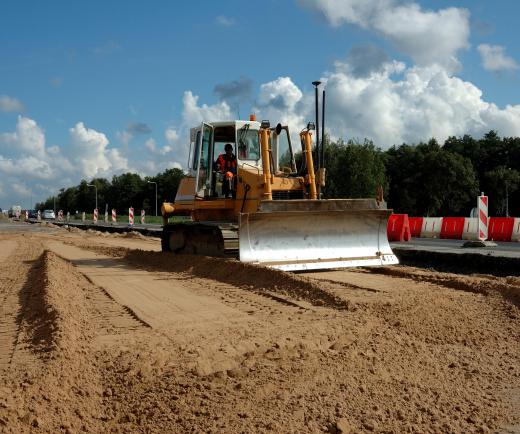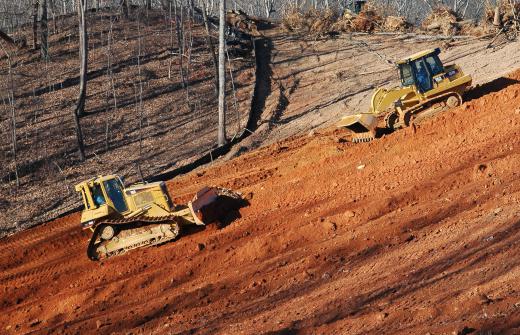A bulldozer is a heavy piece of earthmoving equipment which uses a front-mounted 'dozer' blade to push soil forward and create a level surface for construction sites. A modern bulldozer consists of a tracked chassis, protective driver cage, rear-mounted ripper claw and a variety of front-mounted blades. Some militaries add armor plating to a standard bulldozer for even more protection and deconstruction power.
The earliest bulldozer models were little more than farming tractors equipped with straight front-mounted plates for rough landscaping and plowing. Earthmoving equipment manufacturers such as Case, Terex and International Harvester refined the basic design, curving the front blade for improved cutting power through hardened topsoil. Another modification was the addition of a rear-mounted 'ripper claw' for breaking up boulders and sections of roadway materials. Some bulldozer blades can also slice through trees or double as front-end loader buckets.

There are several theories concerning the origin of the word bulldozer. Technically, the word only applies to the front dozer blade, not the entire machine. Some sources suggest that the power and noise of the chassis suggested a restrained bull, while others point to the extreme medical practice of bull-dosing. What began as a term for a strong dosing of medicine became slang for intimidating tactic. Whatever the original etymology, there is no doubt that a bulldozer can be a very intimidating sight when placed outside a condemned structure.

The most common place to find a bulldozer is a new construction site. The operator may use the rear-mounted ripper claw to break up rocks, pavement or hardened ground. The next step is to set the front-mounted blade at a prescribed depth and literally push the loosened soil forward. Tracks similar to those used on military tanks allow the bulldozer to remain stable on sandy or muddy soil. Eventually the entire site should be level enough for construction to begin. A bulldozer is not usually involved in the more subtle aspects of site preparation, but occasionally it may be used for rough deconstruction or as an auxiliary front-end loader.
The world's militaries also depend heavily on modified bulldozers for battlefield engineering projects and a form of local 'gunship diplomacy.' Perhaps the most famous military bulldozer is the Case D9, used primarily by the Israeli army for decades. The driver's compartment is protected by bullet-resistant glass, while the rest of the machine is heavily armor-plated. When the front blade is raised to the level of the driver's compartment, the Case D9 can drive through most obstacles unscathed.

